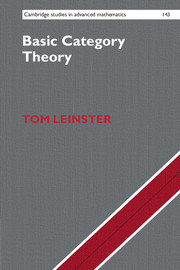Basic Category Theory
Posted by Tom Leinster
My new book is out!
Click the image for more information.
It’s an introductory category theory text, and I can prove it exists: there’s a copy right in front of me. (You too can purchase a proof.) Is it unique? Maybe. Here are three of its properties:
- It doesn’t assume much.
- It sticks to the basics.
- It’s short.
I want to thank the -Café patrons who gave me encouragement during my last week of work on this. As I remarked back then, some aspects of writing a book — even a short one — require a lot of persistence.
But I also want to take this opportunity to make a suggestion. There are now quite a lot of introductions to category theory available, of various lengths, at various levels, and in various styles. I don’t kid myself that mine is particularly special: it’s just what came out of my individual circumstances, as a result of the courses I’d taught. I think the world has plenty of introductions to category theory now.
What would be really good is for there to be a nice second book on category theory. Now, there are already some resources for advanced categorical topics: for instance, in my book, I cite both the Lab and Borceux’s three-volume Handbook of Categorical Algebra for this. But useful as those are, what we’re missing is a shortish book that picks up where Categories for the Working Mathematician leaves off.
Let me be more specific. One of the virtues of Categories for the Working Mathematician (apart from being astoundingly well-written) is that it’s selective. Mac Lane covers a lot in just 262 pages, and he does so by repeatedly making bold choices about what to exclude. For instance, he implicitly proves that for any finitary algebraic theory, the category of algebras has all colimits — but he does so simply by proving it for groups, rather than explicitly addressing the general case. (After all, anyone who knows what a finitary algebraic theory is could easily generalize the proof.) He also writes briskly: few words are wasted.
I’m imagining a second book on category theory of a similar length to Categories for the Working Mathematician, and written in the same brisk and selective manner. Over beers five years ago, Nicola Gambino and I discussed what this hypothetical book ought to contain. I’ve lost the piece of paper I wrote it down on (thus, Nicola is absolved of all blame), but I attempted to recreate it sometime later. Here’s a tentative list of chapters, in no particular order:
- Enriched categories
- 2-categories (and a bit on higher categories)
- Topos theory (obviously only an introduction) and categorical set theory
- Fibrations
- Bimodules, Morita equivalence, Cauchy completeness and absolute colimits
- Operads and Lawvere theories
- Categorical logic (again, just a bit) and internal category theory
- Derived categories
- Flat functors and locally presentable categories
- Ends and Kan extensions (already in Mac Lane’s book, but maybe worth another pass).
Someone else should definitely write such a book.


Re: Basic Category Theory
Congratulations on your new book!
The proposed list of chapters looks rather ambitious. Some of them on their own deserve their own second textbooks, just because none exist yet. For instance, I’ve thought a few times that there should be a “2-categories for the working mathematician”, if only just to collect all the scatted definitions and folklore results in one place. Not being an expert, I am only able to say what I’d hope to learn from such a book:
But perhaps the above is also too ambitious.